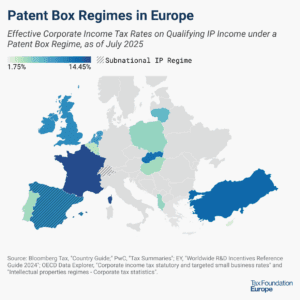
Observing the German Election: Tax Policy for Economic Growth
7 min readBy:The German economy has been contracting for two consecutive years, with corporate investments trailing those of other European countries. Business confidence remains low, and economic outlooks are pessimistic. Against this backdrop, policymakers are debating whether and how taxA tax is a mandatory payment or charge collected by local, state, and national governments from individuals or businesses to cover the costs of general government services, goods, and activities. policy reforms could enhance the country’s attractiveness as a business location and stimulate investment, employment, and economic growth. This article provides reflections on this debate.
Observation 1
In recent years, Germany has become less attractive to business investors, as evidenced by rankings such as the IMD World Competitiveness Index. The country faces deeply rooted structural challenges that require attention. While short-term investment incentives and tax subsidies may provide temporary relief, they cannot substitute for the long-term structural changes needed to restore Germany’s competitiveness.
The German economy faces numerous structural challenges, including high energy prices, emerging trade frictions, excessive red tape, sluggish bureaucratic processes, a shrinking working-age population, and deteriorating public infrastructure. Addressing these challenges requires tackling their root causes rather than alleviating symptoms. Quick fixes such as tax and investment incentives are unlikely to yield sustainable results. Firms do not base their investment decisions on short-term subsidies or tax benefits lasting a year or two; they invest with a focus on medium- and long-term profitability. Ultimately, investment decisions decisively hinge on firms’ expectations of the future economic and policy environment. Germany needs to address the underlying challenges to attract and retain firms and investments in the country.
Observation 2
Germany has one of the highest corporate tax rates in the world. Reducing it would enhance the country’s attractiveness to mobile international investments.
Companies in Germany face a statutory corporate tax rate of approximately 30 percent. This rate is higher than in most other Western economies, lowering Germany’s ability to attract internationally mobile and often highly profitable firms.
When highly productive businesses decide whether to locate a new plant or department in Germany or elsewhere, the prime measure of interest is the statutory tax rate, while deductions and depreciationDepreciation is a measurement of the “useful life” of a business asset, such as machinery or a factory, to determine the multiyear period over which the cost of that asset can be deducted from taxable income. Instead of allowing businesses to deduct the cost of investments immediately (i.e., full expensing), depreciation requires deductions to be taken over time, reducing their value and discouraging investment. rules are of more limited relevance. However, the latter provisions do shape marginal investment activity.
The high corporate tax rate places Germany at a competitive disadvantage when vying for mobile, productive firms and the high-quality jobs they bring. This challenge has become more pronounced over recent years as unilateral and multilateral actions have increasingly restricted multinational firms’ ability to lower their effective tax costs through international tax planning. Consequently, high corporate tax rates today are more likely to deter real economic activity rather than merely trigger profit shiftingProfit shifting is when multinational companies reduce their tax burden by moving the location of their profits from high-tax countries to low-tax jurisdictions and tax havens. —with arguably more detrimental effects on national economies.
Observation 3
Tax deductions and investment premia mainly foster investment of SMEs.
Generous tax deductions can play a positive role too. When firms can deduct investment costs more quickly, their taxable incomeTaxable income is the amount of income subject to tax, after deductions and exemptions. Taxable income differs from—and is less than—gross income. is reduced earlier, effectively deferring tax payments to future periods. Taxpayers benefit from an interest effect—where deferred tax payments reduce the present value of tax liabilities—and a liquidity effect, as firms retain more cash flow in the short term. The outgoing German government, in line with this approach, proposed more generous tax deductions for fixed assets acquired in the coming years. However, the legislative proposal did not pass parliament before the breakup of the three-party coalition.
Reforms along these lines are unlikely to be a game-changer for investments of large and financially unconstrained multinational firms. Empirical evidence, however, suggests that smaller and medium-sized businesses (SMEs)—particularly if they are liquidity-constrained—show sizeable investment responses to this type of policy. Fiscally, the measures are attractive because fiscal costs tend to be small, reflecting that revenue is merely deferred to future periods.
Much-discussed investment premia are related to tax depreciation allowances in that they target investment activity directly, thus limiting windfall gains. However, unlike tax deductions—which defer tax payments—investment premia reduce companies’ net burden and, moreover, also benefit loss-making firms—where the latter might not be socially desirable if the supported businesses are persistent loss-makers with low underlying productivity. Conceptually, a coexistence of investment premia and high corporate tax burdens is, in general, rather unappealing and involves administrative burdens.
Observation 4
Innovation is a key determinant of growth. R&D tax incentives are instrumental in fostering corporate innovation.
Innovation is a key determinant of economic growth. Empirical research shows that the social returns to research and development (R&D) investment exceed the initial investment costs by a large margin. While Germany still ranks high in international innovation reports (due to its well-trained domestic workforce, among other factors), challenges remain. Many of these are outside of the tax realm, including regulatory constraints and a lack of access to finance.
Taxes can play a role in fostering innovation too. Germany introduced an R&D tax incentive in 2020, as one of the last European and OECD countries to implement such a policy. Since then, credit rates and funding limits have been increased. While conclusive evidence for the effect on German firms is still missing, experiences from other countries demonstrate that R&D tax incentives effectively increase firms’ innovative activity. While enhanced R&D spending may in part reflect misuse by firms, which relabel existing activity as R&D, research has also documented that R&D tax incentives are associated with greater real R&D output, such as patents, and with positive knowledge spillovers to society more broadly. Challenges remain, however, and require attention. Survey evidence, for example, suggests that there is scope to improve take-up of the scheme by German firms, such as through information campaigns and facilitated administration.
Moreover, it would be beneficial to expand restrictive loss offsets provisions in the German tax code. This would make the tax code more neutral, particularly for investments characterized by variable income paths over time—like R&D activity, which often comes with losses during the developmental stage and earns positive income in later years only. Enhancing the treatment of losses in Germany would avoid discrimination against these types of investments.
How to Finance the Tax Cuts
Tax cuts need to be financed. While empirical evidence suggests that economic activity and tax bases expand in response, related effects are unlikely to be strong enough to nullify fiscal costs. Adjusting the government budget to allow for such reforms is not a trivial task at a time when government spending requirements are high. Germany needs to invest more in military spending to meet NATO obligations and deal with the new geopolitical challenges; special funds assigned for this task will expire soon. And there is a sizable need to enhance spending for public infrastructure. These longer-term spending needs limit the scope to match tax reductions by lowering public spending. This said, there is still room for action: the spending side of the German government budget features a number of well-known subsidy programs that are perceived as ineffective. In general, strengthening public investments over public consumption would be desirable, for example, by abolishing questionable social spending programs that are not well-targeted to individuals with low incomes and poor health (like early retirement schemes [“Rente mit 63”]).
Germany is bound by a constitutional brake on government debt, which limits options to finance tax breaks by debt. Several parties currently advocate for reforms of the debt brake to facilitate public borrowing, but its fate remains unclear. This leaves tax increases as the remaining source of financing. Economically less distortive taxes—like raising the rate of the value-added tax from a relatively low level compared to other European countries—could make up for the forgone revenue. While this would improve the efficiency of the tax system by raising more revenue from less distortive taxes, the regressive nature of consumption taxation may trigger equity concerns. Policymakers could respond to these concerns along two lines. First, they could emphasize that corporate tax cuts create well-paying jobs and income opportunities, benefiting workers along the whole income distribution. Empirically, corporate tax changes are partly passed on to workers (through higher wages) and consumers (through lower consumer prices). Second, corporate tax reforms could be coupled with other reforms that simultaneously increase the progressivity of the tax system (without too high efficiency costs), like a bolstering of inheritance taxation.
In sum, the next government needs to prioritize measures to improve Germany’s competitiveness as an investment location. Corporate tax reductions should be part of this strategy. The corporate tax burden on firms in Germany is high by international comparison—in the most recent version of the IMD’s World Competitiveness Ranking, the country ranks 62nd out of 67 in the area of taxation. Bringing down corporate taxes would be an important signal to investors—and it would improve locational attractiveness instantaneously, contrary to many other priority areas of government action, like improvements in infrastructure and cutting red tape, which take longer to bear fruit.
Note: This blog post is part of a series focused on the impacts of tax policy and the 2025 German federal election. See more here, here, and here.





